How To Launch Your Digital Product Business
An eight-figure earner today, Dan Henry's journey didn't start off easy.
Back in the day, he was a broke college dropout delivering pizzas. Today, not only is he a Wall Street Journal, Amazon, and USA best-selling author, but he's also been featured in Forbes and Entrepreneur Magazine.
In his road to success, he accumulated $250,000 in IRS debt. It was this debt that kickstarted his journey to building a business that's earned him over $15 million.
This is his story.
If you're looking for advice on scaling a business, especially one selling digital products, tune in. He dives deep into becoming an expert, pricing, and the math behind scaling.
Craving for more juicy content? Subscribe to our podcast and don't forget to check out the Oberlo blog.
Want a condensed version of our chat with Dan instead? Here's a seven-point summary:
- Dan paid off his $250,000 IRS debt by selling and creating 100 copies of a digital marketing course, priced at $1,000 each.
- If you're not selling an info-product on the backend of your ecommerce business, you're basically just giving up money.
- Doubt, pressure, and feeling overwhelmed are just signs of a human being. You gotta recognize that and still move forward.
- You learn not only by doing but also by teaching. The best way to learn something is through teaching it.
- It has to start out okay for it to be better, for it to be good, for it to be great, for it to be fantastic, for it to eventually become legendary.
- If you are an entrepreneur, you shouldn't be talking about passive income.
- To provide a quality product, you have to charge more, period.
Start Yours is a podcast about ecommerce, dropshipping, and all things launching a business.
Join us as we meet entrepreneurs who have gone through the triumphs and headaches of running an online store, and learn how they managed to survive and thrive.



Getting Started With Selling Digital Products
Aleisha: Dan Henry, thank you so much for joining me on Start Yours. I'm so interested in what you do and also sharing a whole different pathway potentially for our listeners. A lot of our Start Yours listeners are selling physical products, they're really successful in the world of ecommerce and dropshipping, or at least have the drive to be very successful.
But I thought this topic today about how to launch a digital product business would be great, to hopefully inspire some of our listeners to broaden their horizons a little bit when it comes to ecommerce and marketing.
→ Click Here to Launch Your Online Business with Shopify
Dan: I'm happy to be here. This is awesome.
Aleisha: Well, tell me, Dan, how you firstly... Pre-successful business Dan, that I'm talking to today, not to say you weren't successful before, but you had a couple of hiccups, I believe. Tell me a little bit about how you got into this world and some of the potential roadblocks that you hit along the way.
Dan: Sure. So I’ve been a digital marketer since 2009, and I was doing okay. It was about 2012, I was doing okay, I was getting back on my feet, I had a rough few years and had some ecommerce stuff going on, I had an agency where I did digital marketing for local businesses.
And I was just starting to get back on my feet, and I got a letter from the IRS that said I had messed up my books from a previous business several years prior, and I owed $250,000.
Aleisha: Wow!
Dan: In back-taxes. And so that was actually the best letter I ever got because what happened was, I started researching online like what's the fastest way to make a lot of money fast? And when I say a lot of money fast, I'm talking about profit. 'Cause if you start a company or like ecom, if you make a million bucks in ecom, a lot of people will take home 150 grand, 200 grand, and that's not making a million bucks.
So I was like, "Alright, what's the fastest way to make actual money that I can use to pay the IRS?" And every article I read all said the same thing: digital products, online courses, coaching... That was it. I really couldn't find anything else that wasn't that that fit that criteria.
And so I studied that and I decided to launch an online course around what I was doing at the time, which was digital marketing for local businesses. And the first day that I did it, I got on a webinar, which is like a live presentation and then you make a pitch, an offer, at the end to buy a more premium version. And I thought, I was like, "Alright, well if I... " So I was selling it for $1,000 and I was like, "If I sell 10 copies, that's $10,000. I can send $10,000 to the IRS and get 'em off my back."
Well, that first night I did $48,000 in sales. 48 copies.
Aleisha: Wow!
Dan: And then I did it again a week later for those who couldn't make the first training, we did another 52 sales. So it was like $100,000 in my first couple of weeks doing it, and I was like, "Alright, well, clearly, this is the industry I need to master and become a part of.” And five months later, I had hit a million dollars in sales for my course.
Fast forward to today, now we have million-dollar months, a lot of the times, we've scaled to over $20 million in sales. And as well, I've even, through the use of a virtual event, had a million-dollar day.
Aleisha: Wow!
Dan: So there's a lot to unpack within that in terms of different mistakes and things I wish I knew then that I know now. And for my clients, because for the longest time I was selling that course on how to do local business marketing. I stopped selling that course after we hit about $8 million in revenue, and I started helping other people that wanted to sell their advice online, wanted to sell courses, coaching.
That was my new passion 'cause I had done so well in it. And I wrote a book called Digital Millionaire Secrets, which was all about my journey to about $10 million, selling my advice, and that book became a Wall Street Journal and USA Today bestseller, and it brought my company a ton of clients. People read my book and then they decide to become a client, and it just really blew things up.
And so, there's a lot I can share on mistakes, there are some things I can share for ecommerce sellers, or for people that primarily wanna sell digital products. So I'm happy to give some value to your audience today.
What Is a Digital Product
Aleisha: Well, and we're happy to receive the value 'cause I think a lot of people, especially in the previous 12 months, we've been through a lot of hardship and a lot of people are trying to pivot away from their day jobs, wanting to leave their day jobs or also just not having access to a day job anymore.
So ecommerce and digital marketing and creating your own product, whether that be a physical product or, as you said, a digital product is something that I know a lot of people are really keen to learn more about.
Tell me a little bit about... Let's unpack a bit what a digital product is. If people are listening and they've never thought about this angle, let's just go back to basics. You mentioned courses. What else sits under that digital product umbrella, before we sort of go deep diving?
Dan: Well, I like to think of it as anything that is really information-based. So, for instance, online courses, ebooks, guides, masterminds, whether in-person or online, coaching, consulting, software even, because we help a lot of software people, because the way in which you sell software is extraordinarily similar to the way in which you sell info.
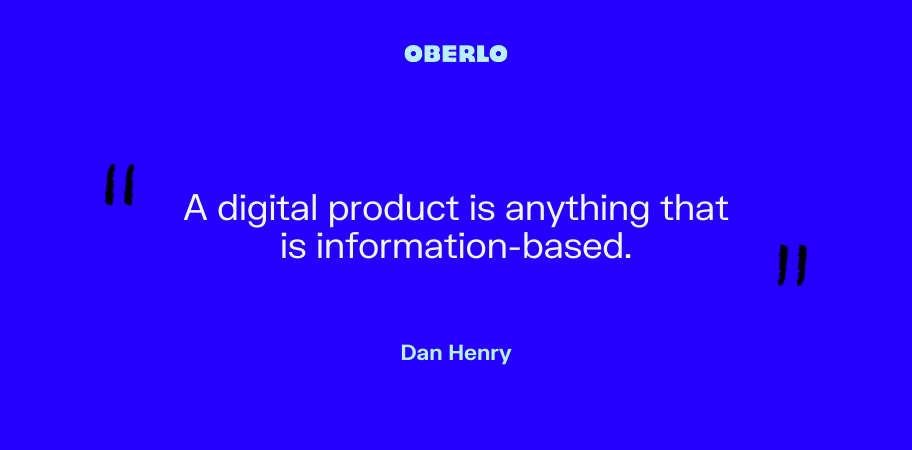
For instance, you don't always have to make info your main business. If you are an ecommerce seller... Just to give you a practical example, let's say you sell barbecue items like grills and tools and sauces and stuff. You could easily pack on an extra hefty, hefty chunk of profit on your P&L by simply offering a cooking course or a barbecue course.
Because think about it, if you have a cost of goods on something, you have to pay that cost of goods, you have to get that stuff from China, or you have to dropship. There has to be not only logistics but the cost of goods in everything you sell.
Whereas if somebody puts a bunch of stuff in their cart for barbecuing and they see, "Oh, I can also buy this digital product, this course," or even an ebook on recipes, it could be anything, you can easily... 'Cause there's no cost of goods there. There's no logistics. They just get a username and password.
For me, any ecommerce seller who is doing ecommerce as their main business, and they have a successful ecommerce store, and they're not selling some sort of info product on the back-end, or not even the back-end, just on their site that somebody can just add to the cart, you're just basically giving up money.
For instance, we're actually starting a physical product business next month. Well, we started it, we're gonna start selling next month. But I designed my own planner. Because I used to buy these planners, and I bought the top ten planners on the market, and I didn't like any of them, and I thought, "This is for people that buy planners, not for people that wanna get things done. This is for people who think planners are cool."
I said, "I need to get things done," so I designed my own, and I went to Kinko's and had a bunch printed out and I used them myself and attacked it from like a high-level CEO type of perspective, and then I started giving them to my employees, and they were like, "Wow, this is the best planner ever."
And so I was like, "Well, let's sell this," so we created a planner. And what we did was, in the planner, we give away a free product... 'Cause it's a productivity planner, so what do we do? We give away a free productivity class with the purchase of every planner. And we share a ton of valuable information in that class.
But then at the end of the class, we say, "Hey, listen, do you wanna take your productivity to the next level? Sign up for our legendary productivity course." And so there's that back-end there, where, look, if you buy a planner, you're obviously trying to be more productive, so a digital product on productivity is that next logical step.
Just like if you have cooking tools, the next logical step is a cooking course.
However, I will tell you that the bulk of our revenue does not come from tacking on an info-product to an ecom site. Our main business is info, and specifically higher-end info, a more VIP red carpet experience than just sending someone a username and password and having them watch videos.
And that's what we teach our clients, and it allows you to not have to deal with a lot of the problems that most course sellers and info product sellers have to deal with while making more money and giving a better result to your clients. So that's something that I can cover as well.
Becoming an Expert in What You Sell
Aleisha: Well, I think that's really interesting, especially just to jump back and really reiterate what you said about people selling physical products with the add-on digital products. So also it's great for SEO if you have extra content on your website as well, and using a simple... When you're adding to cart and having that pop-up and say, "Do you want the cookbook or would you like the planner?"
As you said, there are so many different opportunities for people to make extra money. And it's free money once you produce the digital product. You're not having to buy it or do any extra work for it. So that's such a great point. So thank you for really bringing that home.
When you are looking at creating a digital product, and as you said, if you are potentially moving into a high-end digital product, reading and researching about what you do, I feel like a lot of the question that comes up is people say, "Oh, I'm not really an expert on anything. What do I write my book about?" or, "What is my course about?"
And that really got me humming because I think everyone has something they're really interested in or knowledgeable about. But it does take an extra special push sometimes for you to realize what that is. So what is some advice you give to people who are considering creating a product, but then have that moment of doubt or really can't figure out what it is that they wanna inform and help people with?
Dan: Well, there are a few ways I can attack that one. Number one, everybody who's ever done anything worth anything has had doubts in the beginning. They just have. It's part of being a human being.
And a lot of times as humans, we look at the human condition and we say, "Well, if I feel doubt, if I feel pressure, if I feel overwhelmed, that must be a sign that I shouldn't do it," and in fact, that's just you being human, and you gotta recognize that and still move forward.
But a lot of people don't realize that they're experts in something because they feel like they have to be at the top of the market, they have to be the best in the world, and that's just not true. In fact, that intimidates people, sometimes.
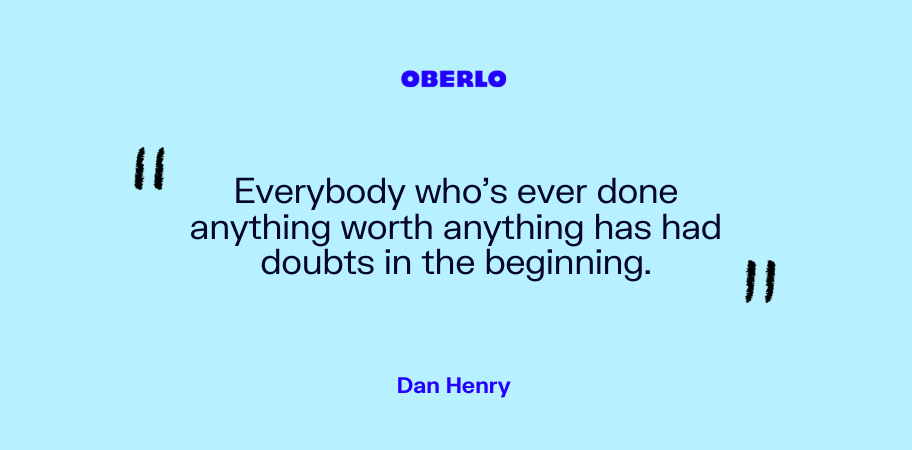
I mean, if you were trying to start a restaurant, if you had two choices between a class from the CEO of Subway and a class from a local restaurant owner who owns three or four family restaurants, a lot of people would choose the three or four family restaurants over the CEO of Subway, 'cause they just can't relate to that, that's just too high up on the food chain for them to relate to.
But that said, almost everybody listening right now is an expert in something.
When I was in college, I paid my way through college by teaching people how to use their home recording software. And that was something I learned through Google and college classes and just doing music recording on my own. You only have to be one step ahead, and you can do that.
But the other way to really think about this is if you were to say to yourself, "Well, I really wanna do this business, I'm not an expert in anything." Well, then, become an expert in something. That's what I did.
So for instance, when I started running Facebook ads, I ran them for my bar. I owned a bar in the tiny town of Spring Hill, Florida, and I ran ads for the bar. And so, when I ran ads for the bar, that's where I learned Facebook ads. And then after I sold the bar, I started doing ads for other businesses, so I got paid to do that.
And then I started doing one-on-one coaching calls to teach people how to run ads, and then I developed a course. That's what gave me the idea to do the course because I read that article and all that.
So a lot of times you can start in sort of an alpha or beta mode by just saying, "Hey, let me go out and teach someone," even if you have to teach somebody for free. And here's the thing, when you start working with people, when you know how to do something, it doesn't necessarily mean you're a good teacher. You have to teach to be a good teacher.
And so you get out there and you help somebody with something and you get them a result, and you get that much better at teaching, then you help somebody else, and you help somebody else. And for instance, in the course of four years – four years – I went from offering a one-on-one coaching call for free just to get a testimonial, just to get somebody to say, "Hey, I spoke to Dan and he gave me great advice and it worked," to today I charge $55,000 for consulting, and I sold three of those last week, just last week. But that's because I never let up and I pursued the mastery of my craft relentlessly.
And that's the thing, is you're probably already an expert in something, you know a lot more than somebody else, and so you begin teaching, you begin helping. And that makes you more of an expert and more of an expert.
The best way to learn something is through teaching it. You get pretty decent at it, you get started, and then you start teaching others. I mean, look at martial arts. I mean, you start learning martial arts, if you do Jujitsu, by the time you're a Blue belt, you're already helping other students. Then you get to Purple belt, you're running classes. Then you get to Brown and Black Belt and you're teaching classes and opening your own schools.
I mean, you not only learn by doing, but you learn by teaching.
It's just a natural flow of information. It's the passing of the torch in multiple layers. And so, by getting down there and doing it, you're going to become better at it, you're gonna become more of an expert at it, you're gonna get better results, you're gonna become more of an authority and your prices are gonna go up, your results are gonna go up.
But if you just sit there and say, "Well, I'm not enough of an expert yet." Well, that's why you're not, 'cause you're sitting there saying that you're not enough of an expert, you're not moving forward, you're not pushing the envelope. And that's what you need to do, you need to constantly push the envelope, and watch it happen.
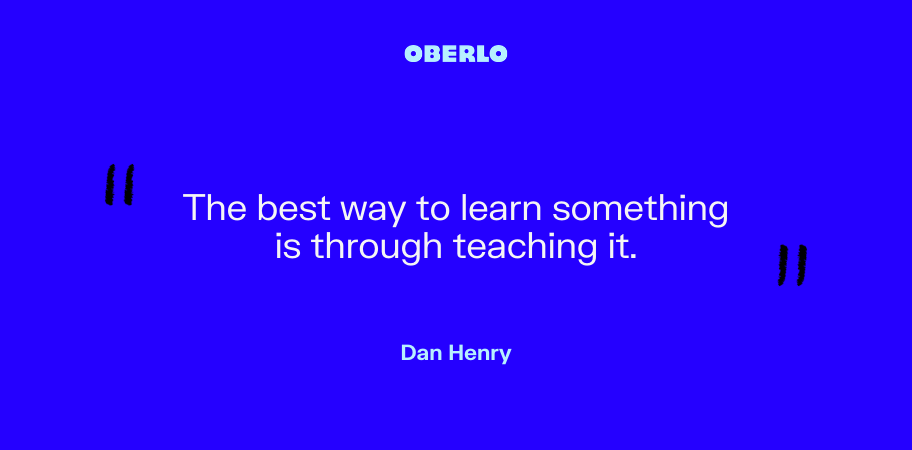
Aleisha: And I like that you say that, and regardless of people, what business they're running. I think we all come across entrepreneurs who are wanting to be entrepreneurs but are always hesitant, and as you said, that fear of not being at the right level or not ready to push the button yet, you've still gotta make tweaks on your website or you need to hone in on your product a little bit more, I think it's totally natural, but it is that leap that you need to take.
And the beautiful thing, I think, about digital products, is that you can tweak them, and you can keep upgrading them and changing them as you go. It doesn't mean that you've created a product in a factory in China and you've ordered 20,000 of them and you're stuffed if you do or stuffed if you don't. Whereas in digital, you can jump in and make an instant change.
Getting Your Hands Dirty
Dan: Tweak it, change it, yeah. And I can tell you this, and this is not just digital products, this is any business. And I do not think you can find an exception to this rule, and I believe this to be true. If you've been in business for some time, even a little time, and you're not yet a millionaire, it is because of one thing and one thing only: You are doing too many things that are unnecessary.
You're spending your time doing things that you don't need to do, like tweaking your logo, tweaking your website, wondering, going to conferences and hugging people and slapping hands and smiling, that's all great but that's not gonna put money in your bank account. Getting down there and getting your hands dirty and doing it and doing the uncomfortable thing... And here's the other thing.
Nothing starts out great. It has to start out okay for it to be better, for it to be good, for it to be great, for it to be fantastic, for it to eventually become legendary.
My clients get way better results today than they did two years ago compared to four years ago, my prices are higher today than they were two and four years ago, my ability to teach is better today than it was six months ago, eight months ago, a year ago, because you naturally get better.
And so one of the biggest things that you have to keep in mind is you have to begin, and it's gonna suck in the beginning, it's gonna not be that good. It's going to be "meh" in the beginning, and that's what it's supposed to be. That's how it becomes fantastic, that's how it becomes legendary.
I mean, look at Jeff Bezos. There's a famous picture of him online sitting in this very modest office with a banner hung up on the wall with the word “Amazon” spray-painted on it. And now, until recently, he was the richest guy in the world. And so that just goes to show you that you have to be okay with it starting out mediocre for it to one day be great.
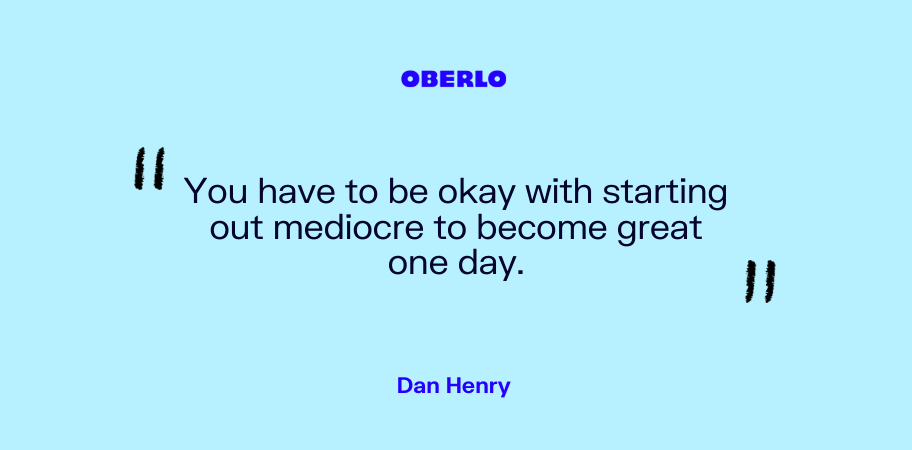
Pricing Your Digital Product
Aleisha: Yeah, take those risks, people. And they're not even big risks, especially when you have success or even a little tiny bit of success that you can then plow that idea into your next business. I'm a big believer in just doing what you wanna do at that moment and not just thinking about it because you're never gonna get anywhere with just thoughts. Thoughts are good, but they're not gonna make you money.
Tell me about pricing, 'cause this seems to be a big issue in the world of digital products. Well, same with physical products, we talk about pricing all the time, and I think sometimes people really underestimate what people are willing to pay for things. But we spend a lot of time looking at other people's products, and other people's marketing, and that can sometimes, I think as an ecommerce person, really distract from what I'm doing.
So what is your advice for first-time digital product launching people? How do we go about even starting to price our beautiful products?
Dan: Well, one of the biggest mistakes that people make, and I don't expect everybody that listens to what I'm about to say to agree with this. Go re-listen to this in two years, and I guarantee you you'll agree with it. But the thing is, is that people vastly under-charge, and what you don't realize is when you under-charge, you do a massive disservice to your clients.
It's sort of like that whole idea, you get what you pay for, and it's better to buy it. For instance, imagine you go to the cheapest guy in town to put a roof on your house and he does it wrong, the roof leaks, now you gotta buy a whole roof all over again, when if you just would have gone to somebody reputable or the best, you'd have saved more money in the long run.
And the thing is, if you're the cheapest, nobody expects you to be the best, and if you're the best, nobody expects you to be the cheapest.
And I recommend you start out high-ticket, meaning at least $3,000. I don't care what you teach, at least $3,000. Unless you're teaching something like how to... Something really, really... How to clean your desk or something, but even that you could turn into an organizational coaching program.
I know somebody that charges $10,000 for marriage coaching. And you think, "Well, who would pay $10,000 for marriage coaching?" Well, think about what's at stake. If they get divorced, what do they stand to lose? Only half of everything they've ever worked for.
That's the thing that people don't think about. If you do a good job, and you are able to work closely with your clients, you're 100 times more likely to get the result than if you just charge them $200 and make them log into a dashboard.
I'll give you an example, and this is the other thing, is a lot of times people try to come out with these small products like tripwires and these $40 things, "Oh, if they buy this product, then maybe they'll buy the next thing up," and that's a myth, it's an urban legend in digital marketing. It is much easier to sell somebody on high-ticket as a first purchase, absolutely. It's just as easy to sell a $5,000-program as it is a $500-program.
And the other thing is there are two types of buyers in the marketplace: there are low-ticket buyers and there are high-ticket buyers.
And these buyers are pre-wired to either buy low or high. Now, yes, you can take a low-ticket buyer and you can turn them into a high-ticket buyer. But it not only takes a lot of time to do that, but it also takes a lot of mindset work.
When you have somebody that’s already okay with paying a premium price to get a premium result, they're easier to sell to because they're already wired that way, and they are easier to work with 'cause they're okay with getting skin in the game. They're a premium client, and they will listen. They will be more coach-able.
And so you will get better results. You'll have easier-to-deal-with clients so you won't pull your hair out. You'll make more money, more profit, you'll need less staff, and you will ultimately have a more scalable business. If you sell a product for $200, you gotta get 5,000 people to buy it, to say yes, to make a million bucks. If you sell a product for $10,000, you gotta get 100 people to say yes. You know what I mean?
Aleisha: Yes.
Dan: And it's not that difficult to provide a higher quality, more VIP experience for your client. People say, "Oh, I just want passive income." Well, if you want passive income then you're not an entrepreneur, you're an investor and you should go learn investing, you should go learn stocks and maybe cryptocurrency and real estate.
But if you wanna be an entrepreneur you shouldn't ever mention the word passive income because that's just not what entrepreneurs do. Cooks do not clean, housekeepers don't cook, and pilots don't drive submarines. If you are an entrepreneur you shouldn't be talking about passive income. If you are you need to look up the definition of an entrepreneur.
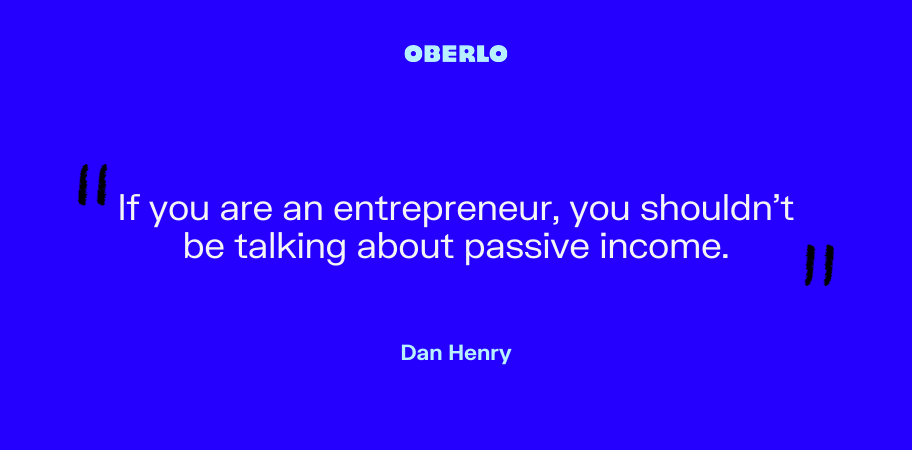
Taking an Active Approach
Aleisha: Yeah, it's true, because I think a lot of people also... We predominantly speak about running ecom and dropshipping businesses, and there is certainly... And it's something we have been really working on trying to clear this attitude that it's a “signup and walk away from a website” situation. Where the world of ecommerce requires a lot of touchpoints for people to make that commitment to buy something.
But also from the back end, it's a lot of touchpoints of working with manufacturers, making sure your shipping is on time, customer service takes up a lot of extra time. There is nothing passive about running any of these businesses. So I'm happy that you said that because I do think people enter into these relationships and really get a bit of a cold wake-up call when they realize, "Oh, I'm gonna have to work pretty hard to make this happen."
And then they leave, they give up, and that's a real shame that we see a lot of drop-offs when actually, if people are on to a good thing they just need to work harder and also think about marketing, think about scaling, think about pricing. And also what they actually wanna be doing with their lives, and if it's just plug and play.
Dan: Well, also thinking about investing in learning how to do all that stuff. You know?
Aleisha: Yes, exactly. Yeah. Yeah.
Dan: Imagine if you were to climb Mount Everest, would you do it without a guide? No. You wouldn't. Because you would fall to your death on jagged rocks. But yet people try to build a business without a guide.
Or would you buy a private plane and not learn to fly? How are you gonna fly the plane? You know what I mean? Would you conduct brain surgery without going to medical school? Would you defend somebody in a court of law without going to law school?
But people somehow think they can start businesses without hiring a consultant who has already built a successful business.
And then, "Oh, I'll just watch free videos on YouTube." Well, I'm still waiting to meet the guy that built an eight-figure business from watching YouTube videos. I don't know where that guy is. And I don't know him.
Aleisha: Well, if he's around, I'd like to interview him or her.
Dan: If there is, it's probably an alien. Because I don't think anybody on this planet has done that. Look, I've spent maybe $300,000 easily on direct coaching. But if I were to take everything, events and everything, I've probably spent maybe about half a million on my own direct education.
Aleisha: Yeah. That's great.
Dan: I've turned that into $20 million. People, they wanna build a premium business, they wanna charge more, but they're not willing to pay more to get that help. And that's an internal conflict.
One of the first things you can do to be able to charge more is to pay more yourself because you get what you are.
Aleisha: Yeah.
Dan: They always say; You're the average of your top five friends. The thing is, if you're a low-ticket buyer, it's gonna be very difficult for you to attract high-ticket buyers. But if you become a high-ticket buyer, then you will attract that same energy in your life.
There's a reason wealthy people buy quality products. It’s because they appreciate quality. And when they appreciate quality and they appreciate something done right, they attract people that also have that appreciation, and therefore their wealth and prosperity grows as well.
But when you always have this money mindset of, "Oh, everything's gonna be cheap. I should just get it cheap." I shouldn't spend that much. I'll just find it cheap or I'll find it for free or whatever, you attract that same energy. And so you get stuck in this never-ending loop of poverty. And that's what a lot of people just don't realize.
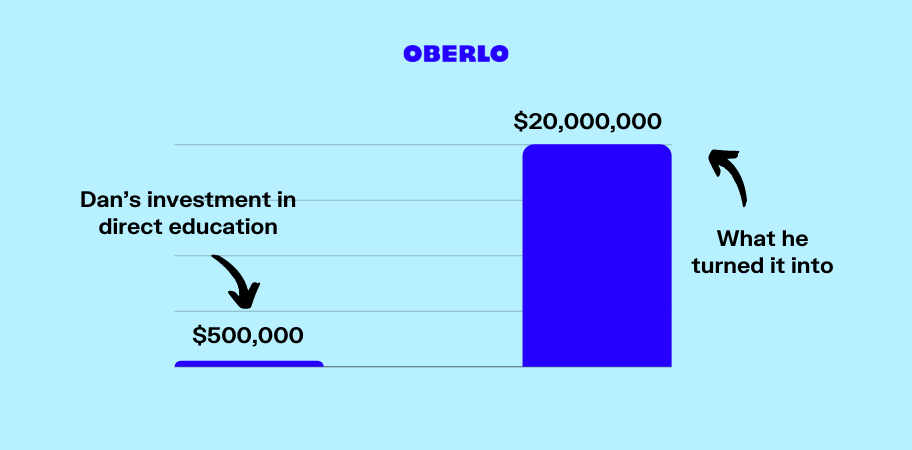
Aleisha: Yeah, it's true. It's totally the mindset. And it's great to hear you encouraging 'cause I think a lot of people just give up on things so quickly. I'm always like the biggest cheerleader, especially speaking to merchants on this show who've had great success.
But the overarching message they come out and say is investment in self, exactly, and is also an investment in time management and realizing, as you said earlier in the interview, not focusing on menial tasks, especially...
I'm a big fan of outsourcing. If someone else can do it better for you, especially if it's customer service you can hire someone to do that so you can focus on creating a better product. Or being able to write better marketing copy. Or thinking more about where you wanna take your business. Even scaling is such a big topic. I know we've probably not got enough time today to talk about that as much. But scaling is where it's at, I think.
The Math Behind Providing a Better Product
Dan: Well scaling is math. I can just give you one quick concrete example. Scaling is math.
Aleisha: Go for it.
Dan: Right. So I used to charge a thousand... And I don't care, I'll tell you my prices. I used to charge a thousand dollars. And for a thousand dollars you got a private Facebook community, you got access to videos and all, and they were great. It was great information. I got good results, don't get me wrong.
But now I charge... My minimum fee to work with us as a client is $10,000. That's the cheapest thing I have. We have a $10,000 group coaching program. We have a $55,000 mastermind, which is my private mastermind. And then I do one-on-one consulting days for $20,000 on my... I just purchased a 60-foot Horizon yacht and we do business consulting on the yacht and make it an experience and all that.
That's very different than charging a thousand dollars. But let's just look at the 10X. The $1,000 versus $10,000. So on the $1,000 one you got video lessons, this, that, and the other thing. On the $10,000 one, there are four coaching calls every single week. Four. There's beginner, and advanced, a tech support call and a sales coaching call.
So here's what happened. I noticed that when we actually spent the money, which we were able to 'cause we charged more, to put those coaches in place, to create systems with manuals and just... I had more money to create this stuff. I could pay a team to make this product better.
So I ended up charging 10 times more. But the product was 100 times better.
And so with that extra support, people would go out and get such a better ROI than... 'Cause imagine, would you rather turn a thousand dollars into $10,000 or would you rather turn $10,000 into $100,000?
Aleisha: Well, I'd rather turn $10,000 to $100,000.
Dan: Right. 'Cause you make $90,000 more.
Aleisha: It's a lot of money.
Dan: And so when you have more help and you have a better-quality product, you get better results so much so that it far outweighs any money you would save in going cheaper. And that's what I realized.
And I had a pretty decent reputation prior, but my reputation and my recognition soared when we charged more because we just got better results. We were able to afford to work with clients so much better.
And we built getclients, cause that's the name of my company, getclients.com. We build getclients.com up, from, "Hey there, here's this Dan Henry kid who's making some splashes, making some waves,” to where I've been able to share the stage with people like Russell Branson, Tony Robbins.
And I will say that the number one thing that made that possible was being able to provide a quality product, and in order to do that you have to charge more, period.
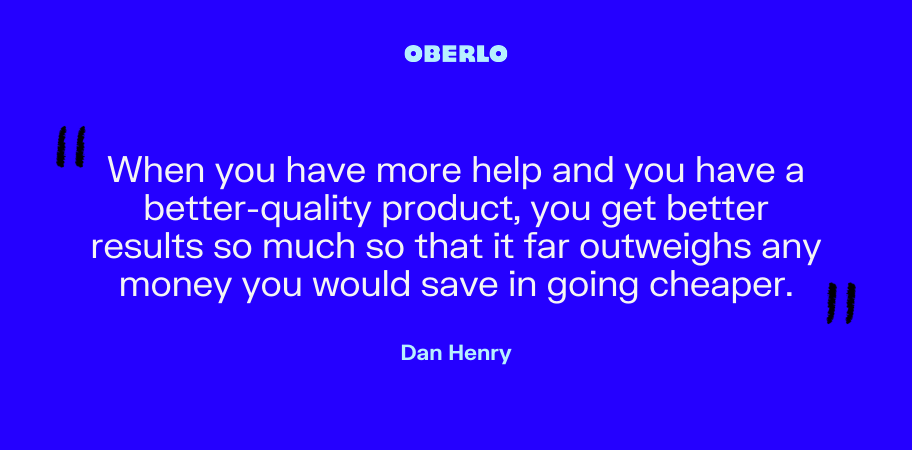
Aleisha: Dan this has been really enlightening and also inspiring for me. I run an ecommerce business, and I'm glad you said it 'cause I sell physical books, but I also have a digital product, which was just an add-on.
So I'm really glad you said that anyone selling ecommerce sort of physical products should be doing that. 'Cause I write wedding planning guides as my side hustle. And then I do an add-on product which is just a sort of digital version of one of the books.
And it's a really easy way to make a little bit extra for me into my check out. So it's fantastic that... I feel validated. Thank you very much. But also inspired to maybe take it up a notch and do some extra things.
So thank you so much for sharing your insights, Dan, and being really transparent. And also going through the process with me. And hopefully, you've inspired some of our listeners to... Well, invest in themselves and hopefully get in touch with you to see what they can do to work with you.
And also take the leap if they haven't done anything and they're thinking about it, and sitting on their hands as my dad would say. Actually making them move. Really been great to just chat with you.
Dan: Awesome, it was absolutely fantastic coming on, and I hope we can do it again sometime.
Aleisha: I really do too. And Dan, if people... You mentioned your website, but if people wanna get in touch, wanna learn a little bit more about what you do. I know you have some really great information out there, where would you guide them to get in touch with you?
Dan: So if you go to getclients.com, that's like the central hub of everything I offer. On that website, you will find a link to get my Wall Street Journal best-selling book, Digital Millionaire Secrets. The book is free, we just charge for shipping.
There's also fantastic training there on how to grow a digital product business. There's a great blog where I have tons of free content, YouTube videos, articles, and my podcast, The Dan Henry Show.
So getclients.com is sort of just like a hub for everything that I offer and put together a ton of free information on there. I think you'll definitely enjoy it.
Aleisha: That's awesome, Dan. Well, thank you. And I would love to speak with you again and take this a little further and learn a bit more about how people can, as you said, scale and also really learn more about how they can charge more for what they do.
Dan: Awesome, I would absolutely love to come on again, thank you so much.
Aleisha: Thanks, Dan, take care.


